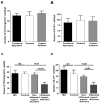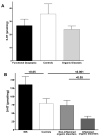Serotonin signaling is altered in irritable bowel syndrome with diarrhea but not in functional dyspepsia in pediatric age patients - PubMed (original) (raw)
Serotonin signaling is altered in irritable bowel syndrome with diarrhea but not in functional dyspepsia in pediatric age patients
Christophe Faure et al. Gastroenterology. 2010 Jul.
Abstract
Background & aims: In adults, irritable bowel syndrome (IBS) and functional dyspepsia (FD) are chronic conditions that often start during childhood. We investigated mucosal serotonin (5-HT) signaling in children with the idea that data from subjects with a shorter history may improve our understanding of underlying pathophysiological mechanisms.
Methods: Ninety-eight children undergoing gastroscopy or colonoscopy were studied prospectively. Biopsy specimens were evaluated for inflammation, enterochromaffin cell numbers, 5-HT content, and messenger RNA (mRNA) levels for the synthetic enzyme, tryptophan hydroxylase 1, and the serotonin transporter (SERT) were assessed by quantitative real-time reverse-transcription polymerase chain reaction.
Results: Data from 12 children with IBS and 17 with FD were compared with age-matched controls (12 with rectal biopsies and 12 with gastric biopsies) and with subjects with organic disorders. In patients with FD, a small number of immune cells were observed in the gastric mucosa in half of the patients, but no abnormalities with respect to the 5-HT pathway were identified. In patients with IBS, no differences were detected between patients and controls regarding intraepithelial lymphocytes and CD3+ cells in the lamina propria although all patients showed at least a slight inflammatory infiltrate. In the IBS samples, higher 5-HT content (P < .01) and lower SERT mRNA (P < .05) were detected as compared with controls. Severe inflammation in the colonic mucosa had a high impact on 5-HT signaling with a significant decrease in enterochromaffin cells (P < .01) and 5-HT content (P < .01) and a high SERT mRNA expression (P < .01).
Conclusions: These results confirm the role of 5-HT signaling in IBS in children and argue against such a role in FD.
Copyright 2010 AGA Institute. Published by Elsevier Inc. All rights reserved.
Conflict of interest statement
Conflict of interest: NONE
Figures
Figure 1
(A) Enteroendocrine (chromogranin positive) cell and (B) enterochromaffin (5-HT positive) cell counts in the gastric mucosa of patients with functional dyspepsia (FD) are similar as compared to control subjects and subjects with organic diseases. (C) Enteroendocrine (chromogranin positive) cell and (D) enterochromaffin (5-HT positive) cell counts in the rectal mucosa of patients with irritable bowel syndrome (IBS), control subjects and subjects with organic diseases with inflammation grading ≥ 2 (Inflammed organic disorders) and without inflammation (Non-inflammed organic disorders). No significant differences were detected in enteroendocrine and enterochromaffin cell counts of samples from patients with IBS as compared to controls. Biopsies with inflammation grading ≥ 2 obtained from subjects with organic disease exhibited significant lower enteroendocrine and enterochromaffin cell counts as compared to controls and biopsies without inflammation (grade ≤ 1).
Figure 2
(A) Serotonin (5-HT) content in the gastric mucosa of patients with functional dyspepsia (FD) is similar as compared to control subjects and subjects with organic diseases. (B) 5-HT content in the rectal mucosa of patients with irritable bowel syndrome (IBS), control subjects and subjects with organic diseases with inflammation grading ≥ 2 (Inflammed organic disorders) and without inflammation (Non-inflammed organic disorders). 5-HT content is significantly higher in the rectal mucosa of patients with IBS as compared to control subjects. 5-HT levels are significantly lower in biopsies obtained from subjects with Inflammed organic disorders as compared to controls and biopsies from Non-inflammed organic disorders.
Figure 3
Relative expression of tryptophan hydroxylase-1 (TpH-1) mRNA in the rectal mucosa of patients with irritable bowel syndrome (IBS), control subjects and subjects with organic diseases with inflammation grading ≥ 2 (Inflammed organic disorders) and without inflammation (Non-inflammed organic disorders). No significant differences were detected in TpH-1 transcript levels of samples from patients with IBS as compared to controls. TpH-1 transcript levels are significantly higher in biopsies obtained from subjects with Inflammed organic disorders as compared to controls and biopsies from Non-inflammed organic disorders.
Figure 4
Relative expression of serotonin reuptake transporter (SERT) mRNA in the rectal mucosa of patients with irritable bowel syndrome (IBS), control subjects and subjects with organic diseases with inflammation grading ≥ 2 (Inflammed organic disorders) and without inflammation (Non-inflammed organic disorders). A significantly lower level of SERT transcript was detected in samples from patients with IBS as compared to controls. SERT transcript levels are significantly increased in biopsies obtained from subjects with Inflammed organic disorders as compared to controls and biopsies from Non-inflammed organic disorders.
Similar articles
- Molecular defects in mucosal serotonin content and decreased serotonin reuptake transporter in ulcerative colitis and irritable bowel syndrome.
Coates MD, Mahoney CR, Linden DR, Sampson JE, Chen J, Blaszyk H, Crowell MD, Sharkey KA, Gershon MD, Mawe GM, Moses PL. Coates MD, et al. Gastroenterology. 2004 Jun;126(7):1657-64. doi: 10.1053/j.gastro.2004.03.013. Gastroenterology. 2004. PMID: 15188158 - Impaired uptake of serotonin by platelets from patients with irritable bowel syndrome correlates with duodenal immune activation.
Foley S, Garsed K, Singh G, Duroudier NP, Swan C, Hall IP, Zaitoun A, Bennett A, Marsden C, Holmes G, Walls A, Spiller RC. Foley S, et al. Gastroenterology. 2011 May;140(5):1434-43.e1. doi: 10.1053/j.gastro.2011.01.052. Epub 2011 Mar 23. Gastroenterology. 2011. PMID: 21315720 - SERT and TPH-1 mRNA expression are reduced in irritable bowel syndrome patients regardless of visceral sensitivity state in large intestine.
Kerckhoffs AP, ter Linde JJ, Akkermans LM, Samsom M. Kerckhoffs AP, et al. Am J Physiol Gastrointest Liver Physiol. 2012 May 1;302(9):G1053-60. doi: 10.1152/ajpgi.00153.2011. Epub 2012 Feb 9. Am J Physiol Gastrointest Liver Physiol. 2012. PMID: 22323131 - Regulation of the serotonin transporter in the pathogenesis of irritable bowel syndrome.
Jin DC, Cao HL, Xu MQ, Wang SN, Wang YM, Yan F, Wang BM. Jin DC, et al. World J Gastroenterol. 2016 Sep 28;22(36):8137-48. doi: 10.3748/wjg.v22.i36.8137. World J Gastroenterol. 2016. PMID: 27688655 Free PMC article. Review. - [Role of serotonin in the pathophysiology of the irritable bowel syndrome].
Moskwa A, Boznańska P. Moskwa A, et al. Wiad Lek. 2007;60(7-8):371-6. Wiad Lek. 2007. PMID: 18175558 Review. Polish.
Cited by
- Differential mRNA expression in ileal and colonic biopsies in irritable bowel syndrome with diarrhea or constipation.
Camilleri M, Magnus Y, Carlson P, Wang XJ, Chedid V, Maselli D, Taylor A, McKinzie S, Kengunte Nagaraj N, Busciglio I, Nair A. Camilleri M, et al. Am J Physiol Gastrointest Liver Physiol. 2022 Aug 1;323(2):G88-G101. doi: 10.1152/ajpgi.00063.2022. Epub 2022 May 3. Am J Physiol Gastrointest Liver Physiol. 2022. PMID: 35502856 Free PMC article. - Gene network inference and biochemical assessment delineates GPCR pathways and CREB targets in small intestinal neuroendocrine neoplasia.
Drozdov I, Svejda B, Gustafsson BI, Mane S, Pfragner R, Kidd M, Modlin IM. Drozdov I, et al. PLoS One. 2011;6(8):e22457. doi: 10.1371/journal.pone.0022457. Epub 2011 Aug 11. PLoS One. 2011. PMID: 21853033 Free PMC article. - Epidermal growth factor upregulates serotonin transporter and its association with visceral hypersensitivity in irritable bowel syndrome.
Cui XF, Zhou WM, Yang Y, Zhou J, Li XL, Lin L, Zhang HJ. Cui XF, et al. World J Gastroenterol. 2014 Oct 7;20(37):13521-9. doi: 10.3748/wjg.v20.i37.13521. World J Gastroenterol. 2014. PMID: 25309082 Free PMC article. - Irritable bowel syndrome: a clinical review.
Soares RL. Soares RL. World J Gastroenterol. 2014 Sep 14;20(34):12144-60. doi: 10.3748/wjg.v20.i34.12144. World J Gastroenterol. 2014. PMID: 25232249 Free PMC article. Review. - The injury of serotonin on intestinal epithelium cell renewal of weaned diarrhoea mice.
Dong Y, Yang C, Wang Z, Qin Z, Cao J, Chen Y. Dong Y, et al. Eur J Histochem. 2016 Dec 28;60(4):2689. doi: 10.4081/ejh.2016.2689. Eur J Histochem. 2016. PMID: 28076934 Free PMC article.
References
- Subcommittee on Chronic Abdominal Pain. Chronic Abdominal Pain in Children. Pediatrics. 2005;115:e370–381. - PubMed
- Helgeland H, Flagstad G, Grøtta J, et al. Diagnosing Pediatric Functional Abdominal Pain in Children (4-15 Years Old) According to the Rome III Criteria: Results From a Norwegian Prospective Study. Journal of Pediatric Gastroenterology and Nutrition. 2009;49:309–315. doi: 10.1097/MPG.0b013e31818de3ab. - DOI - PubMed
- Faure C, Wieckowska A. Somatic Referral of Visceral Sensations and Rectal Sensory Threshold for Pain in Children with Functional Gastrointestinal Disorders. J Pediatr. 2007;150:66–71. - PubMed
- Van Ginkel R, Voskuijl WP, Benninga MA, et al. Alterations in rectal sensitivity and motility in childhood irritable bowel syndrome. Gastroenterology. 2001;120:31–8. - PubMed
- Iovino P, Tremolaterra F, Boccia G, et al. Irritable bowel syndrome in childhood: visceral hypersensitivity and psychosocial aspects. Neurogastroenterol Motil. 2009;21:940–e74. - PubMed
Publication types
MeSH terms
Substances
LinkOut - more resources
Full Text Sources
Other Literature Sources
Medical



